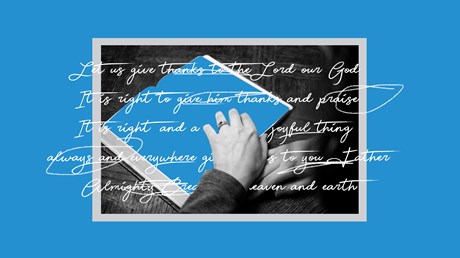The words I say every Sunday guide me toward gratefulness.

I grew up doing sword drills. The Sunday school teacher or youth group leader would yell out a passage, chapter and verse, and we would scramble to find it first. It was important to the churches I grew up in and the evangelical subculture I was raised in that we were “Bible people.”
Years later, when I began a doctoral program in political theology, I joined a church in a different tradition than the one I’d grown up in. My new church was still fairly “low church” in many ways—no smells or bells or vestments and a plain church building. But in this context, I encountered sword drills of another sort in the form of liturgy—words meant to engrain God’s Word in our hearts.
After the reading of Scripture, the pastor says, “This is the Word of the Lord,” and the congregation responds, “Thanks be to God.” In those two short phrases, I have found a rich theology of Scripture that directly addresses our anxieties about how to use the Bible in a theologically and politically fraught world.
As theologian Brad East writes in his book The Church’s Book: Theology of Scripture in Ecclesial Context, the liturgical designation of a text as “the word of the Lord” alerts the gathered community that what they hear is “for them the living speech of God.”
This miracle of human and divine words is possible because God delights in using humans for redemptive purposes beyond themselves. While people are “like grass, and all their glory is like the flowers of the field,” as 1 Peter 1:24–25 says, “the word of the Lord endures forever.”
Our familiarity with this miracle might conceal how incredible it is. While the books ...
from Christianity Today Magazine
Umn ministry


.gif)

.gif)
.gif)
